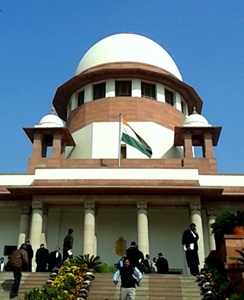The Supreme Court today refused to grant stay on the Citizenship Amendment Act (CAA), a central legislation granting citizenship rights to persecuted minority community refugees from neighbouring Pakistan, Bangladesh and Afghanistan who have entered India before 31 December 2014 as it took up for hearing a batch of petitions filed against the Act.

The petitioners have moved the court alleging that the Citizenship Amendment Act and the subsequent National Population Register are discriminatory and hence in violation of the Constitution as the Act only refers to Hindu, Sikh, Buddhist, Jain, Parsi and Christian refugees fleeing persecution in the three Muslim countries.
The Supreme Court also sent notice to the central government regarding the petitions and sought reply within four weeks. It also proposed to set up a five-judge Constitution bench to hear the petitions.
A three-judge SC bench comprising Chief Justice of India (CJI) SA Bobde, Justice S Abdul Nazeer and Justice Sanjiv Khanna said the matter will be listed before the SC after five weeks for interim orders. The SC also said that any interim order in this matter can be passed only by a constitution bench.
The SC, however, said that matters concerning Assam and Tripura will be dealt with separately as the problem with CAA in these two states is different from rest of the country and asked senior advocate Kapil Sibal to assist in identifying these matters.
“The petitions concerning Assam and Tripura as well as matters related to Uttar Pradesh, which is going ahead with the implementation of CAA without framing any rules, can be dealt with separately,” the court said.
The top court also issued notice to all the petitions and directed them to compile a list of all categories on which there has been a challenge that the court needs to hear in future.
During the hearing, senior advocate KV Viswanathan also raised the issue of NPR and said that the NPR exercise should be postponed because it provides for "doubtful" status on one's citizenship.
Advocate Abhishek Manu Singhvi also raised the issue of "doubtful citizen" and told the court that several households in Uttar Pradesh have been marked out as unidentifiable and stressed that these people could possibly lose voting rights.
Attorney General KK Venugopal appearing for the Centre said the government had been given copies of only 60 of 143 petitions and hence the Centre needed more time to respond.
The Supreme Court also directed high courts across the country not to pass any order on the new legislation before the SC concludes the hearing on the CAA.
The Citizenship (Amendment) Bill, 2019 became an Act on 12 December after President Ram Nath Kovind gave assent to it.
Various politicians, including RJD leader Manoj Jha, Trinamool Congress MP Mahua Moitra, AIMIM leader Asaduddin Owaisi, have filed petitions challenging the constitutional validity of the CAA.
Some of the others petitioners challenging the Act include Muslim body Jamiat Ulama-i-Hind, All Assam Students Union (AASU), Peace Party, CPI, NGOs ‘Rihai Manch’ and Citizens Against Hate, advocate M L Sharma, and law students.




















